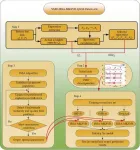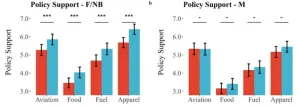(Press-News.org) April 2, 2024 – In a report published on March 21, 2024 in EMBO Molecular Medicine (A replication competent Plasmodium falciparum parasite completely attenuated by dual gene deletion) investigators at Seattle Children’s Research Institute and Sanaria Inc. describe the development of a whole malaria parasite vaccine strain that infects the liver, develops to the late liver stage, and then gets completely stuck and cannot burst out of the liver to cause symptomatic blood infection. The creation of this strain called LARC2 (Late liver-stage Arresting, Replication Competent) was accomplished by deletion of only two parasite genes out of the approximately 5,000 in the Plasmodium falciparum (Pf) parasite genome, This incapacitated parasite strain will be the sole immunogen in Sanaria’s third generation vaccine, Sanaria® PfSPZ LARC2 Vaccine. The study was led by Dr. Debashree Goswami and Dr. Hardik Patel working in the laboratory of Dr. Stefan Kappe at Seattle Children’s Research Institute and a team at Sanaria led by Dr. B. Kim Lee Sim.
Mosquitoes inoculate malaria parasites called sporozoites (SPZ), which rapidly infect liver cells within which each individual parasite can multiply to produce up to 50,000 parasites over 6-7 days. This first phase of infection goes completely unnoticed and doesn’t cause any symptoms. When the parasites burst out of the liver they infect tens of thousands of red blood cells, causing deadly malaria disease. The Kappe team, in collaboration with Dr. Ashley Vaughan at Seattle Children’s Research Institute, constructed the LARC2 strain by deleting two critical genes without which the parasites multiply in the liver almost to maturity but then disintegrate, which prevents new parasites from getting into the blood stream. In this way, LARC2 parasites stimulate a very strong immune response in the liver, which protects against future malaria infections. By assessing aseptic, purified, cryopreserved PfSPZ-LARC2 produced at Sanaria in humanized mice with human liver cells and human red blood cells, the study team was able to show that the mature, late liver stages of the malaria parasite life cycle were completely compromised.
“These weakened parasite strains can check in but they can’t check out,” says Kappe, who is also a professor in the Department of Pediatrics at the University of Washington.
Sanaria founder and CEO, Stephen L. Hoffman, MD said, “Sanaria’s PfSPZ-LARC2 Vaccine has the potential to save millions of lives and eliminate malaria from defined geographic areas when administered in mass vaccination programs. We are planning to assess PfSPZ-LARC2 Vaccine in clinical trials in 2024 in the US, Germany, and Burkina Faso. Previous generations of PfSPZ vaccines either do not meet WHO requirements for 90% protection against infection or have potential for breakthrough infections into the blood stream. We are therefore eagerly anticipating taking this novel, genetically engineered vaccine strain into clinical studies.”
To protect against and eliminate malaria the WHO has recognized the need for vaccines that prevent human blood-stage infection in individuals that have >90% vaccine efficacy for at least 12 months against infection with naturally transmitted Plasmodium falciparum malaria, which is responsible for >98% of the 625,000 deaths from malaria. Only Sanaria’s P. falciparum sporozoite vaccines have achieved >90% vaccine efficacy against controlled human malaria infections and shown sustained protection without boosting against natural transmission in Africa. PfSPZ-LARC2 parasites are predicted to induce strong cellular immune responses in the liver that will be highly protective against infection. In their publication the study team demonstrated that LARC2 vaccination completely protects against infection in mouse models of malaria.
“It took us nearly 20 years to get to the PfSPZ-LARC2 Vaccine” says Kappe. “Finding the right genes that, when removed from the parasite genome, stop the parasite right when it wants to get out of the liver, was an enormous task. Our results provide a clear indication that safe, complete developmental attenuation of malaria parasites is possible and we are excited to see the outcome of the first clinical trials with this vaccine.”
“We are enthusiastic about the potential for PfSPZ-LARC2 Vaccine to prevent malaria in travelers to endemic regions, and in pregnant women and children in areas with malaria, and eventually to eliminate malaria from entire regions,” said Professor Peter Kremsner, Director of the Institute for Tropical Medicine, University of Tübingen in Germany, and President of the Centre de Recherches Médicales de Lambaréné (CERMEL) in Gabon.
About Sanaria Inc.:
Sanaria Inc. was founded in 2003. The Company's primary mission since the outset has been to develop and commercialize whole-parasite malaria vaccines that confer high-level, long-lasting protection against Plasmodium falciparum, the parasite responsible for most of the malaria-associated severe illness and death worldwide, as well as other parasites that cause human malaria, and to use these vaccines to prevent malaria in individuals and eliminate malaria from entire populations in selected regions. Sanaria's corporate headquarters, administrative, research, development, and manufacturing operations are in Rockville, Maryland. The Company's website is www.sanaria.com.
This news release contains certain forward-looking statements that involve known and unknown risks and uncertainties, which may cause actual results to differ materially from anticipated results or achievements expressed or implied by the statements made. Such statements include the availability of an effective vaccine, the expectations for eliminating malaria, and beliefs concerning the suitability of a successful vaccine. These forward-looking statements are further qualified by important factors that could cause actual results to differ materially from those in the forward-looking statements. These factors include, without limitation, the Company's ability to raise sufficient funds, the regulatory approval process, clinical trials results, the Company's patent portfolio, dependence on key personnel and other risks associated with vaccine development. For further information contact Alexander Hoffman, press@sanaria.com, 301-770-3222 or Jamie Baum, newsPRos, PR Counsel, 847-502-3825, JSB@newspros.com.
END
A paper proposing a hybrid data driven framework considering feature extraction for battery state of health estimation and remaining useful life prediction was published in the journal Green Energy and Intelligent Transportation on 29 March 2024.
VMD is used for completely non-recursive modal variation to deal with signals. The optimal solution of the variational problem is obtained finally by effective decomposition component of the given signal. By iteration, the VMD algorithm can decompose the signals into some intrinsic ...
Complimentary press passes are now available for NUTRITION 2024, the annual flagship meeting of the American Society for Nutrition. Join us June 29–July 2 in Chicago for the latest developments in nutrition research, practice and policy.
As the pre-eminent meeting in nutrition science, NUTRITION attracts thousands of scientists, practitioners, policymakers, advocacy leaders and industry professionals each year. Reporters are invited to attend in person to connect with the field’s leaders and learn about exciting scientific ...
AMHERST, Mass. – A group of researchers led by University of Massachusetts Amherst engineers have created ultraviolet (UV) rays-emitting glass that can reduce 98% of biofilm from growing on surfaces in underwater environments, as reported in the journal Biofilm.
Biofilm is a slimy layer of various types of microorganisms that grows on wet surfaces. “If you look down your sink and touch the inner side of it—that slimy substance is biofilm,” describes Mariana Lanzarini-Lopes, ...
A woman’s cardiovascular risk can rise sharply after she goes through menopause, quickly catching up to men of a similar age and health profile, according to new findings presented at the American College of Cardiology’s Annual Scientific Session. Researchers said the study underscores the importance of recognizing and addressing early warning signs of heart disease risk in women as they lose the protective effects of estrogen after menopause.
“This is a unique study cohort of only post-menopausal ...
Individuals with heart disease stand to gain the most from a low-sodium diet but, on average, consume over twice the recommended daily sodium intake, according to a study being presented at the American College of Cardiology’s Annual Scientific Session.
Sodium is an essential nutrient, but consuming too much can raise blood pressure, which damages blood vessels and forces the heart to work harder. Excess sodium can also cause the body to retain fluid, exacerbating conditions like heart failure. The current U.S. Dietary Guidelines put out by the U.S. Department of Agriculture ...
People who use e-cigarettes are significantly more likely to develop heart failure compared with those who have never used them, according to one of the largest prospective studies to date investigating possible links between vaping and heart failure. The findings are being presented at the American College of Cardiology’s Annual Scientific Session.
Heart failure is a condition affecting more than 6 million U.S. adults in which the heart becomes too stiff or too weak to pump blood as effectively as it should. It can often lead to debilitating symptoms and frequent hospitalizations as people age. Electronic nicotine products, which include ...
Is the view from your doorstep mostly trees and sky or buildings and grass? The answer could influence your cardiovascular health, according to a study presented at the American College of Cardiology’s Annual Scientific Session. Using an analysis of Google Street View images powered by machine learning, researchers found people living in surroundings rich in sidewalks, trees and clear sky saw a significantly lower risk of major adverse cardiac events.
“A lot of research has shown that environmental factors strongly affect our health. If we can find a way to stratify this risk and provide interventions before cardiovascular events happen, then ...
Chestnut Hill, Mass (4/2/2024) – Dual topological phases have been discovered in an intrinsic monolayer crystal, a finding that reveals new and unique rule-bending properties in a quantum material, an international team of scientists led by Boston College physicists reported recently in the online version of the journal Nature.
The discovery of a dual topological insulator introduces a new method for creating topological flat minibands through electron interactions, which offer a promising platform for exploring exotic quantum phases and electromagnetism, ...
Brussels, Belgium, and San Francisco, United States - The Public Library of Science (PLOS) and the European Council of Doctoral Candidates and Junior Researchers (“Eurodoc”), today announced a strategic partnership between the organizations to increase awareness of Open Science, its principles, and its implementation into research practices.
“In addition to supporting researchers, we also strive to support the implementation of Open Science principles and increase the adoption of ...
Investments in mitigating climate change in many cases benefit future generations more than those alive today. However, initial costs must be borne by those living now, so many climate mitigation policies rely on some level of intergenerational altruism for support. To investigate the strength and shape of intergenerational altruism, Gustav Agneman and colleagues asked Swedish study participants to engage in an experimental task in which they allocated fictional resources across generations, after being told how many descendants they might be expected to have in the next 250 years. On average, participants allocated most of the resources to the present generation, and fewer and ...



